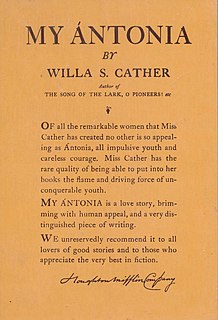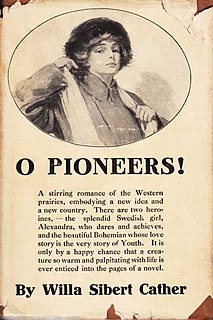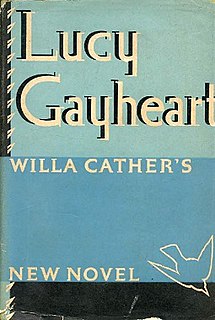Related Research Articles

Willa Sibert Cather was an American writer known for her novels of life on the Great Plains, including O Pioneers!, The Song of the Lark, and My Ántonia. In 1923 she was awarded the Pulitzer Prize for One of Ours, a novel set during World War I.

My Ántonia is a novel published in 1918 by American writer Willa Cather, considered one of her best works.

Charles Stanley Reinhart, usually cited as C. S. Reinhart, was an American painter and illustrator. He was a nephew of artist Benjamin Franklin Reinhart.

O Pioneers! is a 1913 novel by American author Willa Cather, written while she was living in New York. This is her second published novel.
"Paul's Case" is a short story by Willa Cather. It was first published in McClure's Magazine in 1905 under the title "Paul's Case: A Study in Temperament" and was later shortened. It also appeared in a collection of Cather's stories, The Troll Garden (1905). For many years "Paul's Case" was the only one of her stories that Cather allowed to be anthologized.

Lucy Gayheart is Willa Cather's eleventh novel. It was published in 1935. The novel revolves round the eponymous character, Lucy Gayheart, a young girl from a town near the Platte River, Haverford.
El Dorado: A Kansas Recessional is a short story by Willa Cather. It was first published in New England Magazine in June 1901.
"Nanette: An Aside" is a short story by Willa Cather. It was first published in Courier on 31 July 1897 and one month later in Home Monthly.
"A Gold Slipper" is a short story by Willa Cather. It was first published in Harper's in January 1917.
Ardessa is a short story by Willa Cather. It was first published in Century in May 1918.
"A Resurrection" is a short story by American writer Willa Cather. It was first published in Home Monthly in April 1897.
The Affair at Grover Station is a short story by Willa Cather. It was first published in Library in June 1900 in two installments, and reprinted in the Lincoln Courier one month later. The story is about a geological student asking an old friend of his about the recent murder of a station agent.
The Profile is a short story by Willa Cather. It was first published in McClure's in June 1907.
The Namesake is a short story by Willa Cather. It was first published in McClure's in March 1907.
The Treasure of Far Island is a short story by Willa Cather. It was first published in New England Magazine in October 1902.
"The Diamond Mine" is a short story by Willa Cather. It was first published in McClure's in October 1916.

The Troll Garden is a collection of short stories by Willa Cather, published in 1905.

Youth and the Bright Medusa is a collection of short stories by Willa Cather, published in 1920. Several were published in an earlier collection, The Troll Garden.
The Elopement of Allen Poole is a short story by Willa Cather, first published in 1893 by The Hesperian while she was a student. The story itself deals with the character of Allen Poole, who is shot by an officer on the night of his elopement with his partner, Nell.
The Best Years is a short story by Willa Cather, first published after her death in the collection The Old Beauty and Others in 1948. It is her final work, and was intended as a gift to her brother, Roscoe Cather, who died as it was being written. Set in Nebraska and the northeastern United States, the story takes place over twenty years, tracing the response of Lesley Ferguesson's family to her death in a snowstorm.